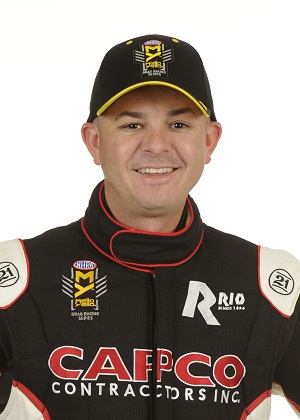TORRENCE, BECKMAN SHARE COMMON BOND OF BEATING CANCER


Their respective grapples are not on the strip or in the championship points; nor do they have anything to do with drag racing.
They are cancer survivors.
The faced the dreaded disease in two different stages of their lives. Torrence was 17 with a full life ahead of him, while Beckman was 37 and already had an NHRA Lucas Oil title to his credit.
They both do the annual check-ups to ensure the disease hasn't returned and within the past month, both have received clean bills of health.
Still the images of the unknown haunt them regardless of the positive prognosis.
"If I could go back in time to early 2004, and God appeared with two choices, 'You're going to get cancer, and you will live and make you a better person, or you won't get cancer at all,” said Beckman. "The answer is simple; I wouldn't want cancer at all. The one thing most people don't understand is cancer never goes away. The cell mutations might, but the psychological damage never heals."
Both Beckman and Torrence go routinely for check-ups but it’s the between time which hits the hardest. It’s the uncertainty, the fear of having to fight for their life all over again, again and again which concerns them.
Beckman, for all of his positive energy and persona, has a measure of negativity hanging over his head like a dark cloud.
"My doctor saw some things in my blood work up he didn't like," Beckman admitted. I had some pains I didn't feel comfortable with and in the back of my mind led me to believe my cancer was back."
The fear of crashing a Top Fuel dragster at 300 miles per hour for Torrence pales in comparison to the terror of crashing an annual check-up. Days before the NHRA Southern Nationals last month, Torrence passed the test.
“I go into Texas Oncology at Baylor Medical Center in Dallas yearly, and do my normal chest x-rays, P.E.T. Scan, bloodwork," Torrence said. "No matter what, it’s still a little nerve-wracking to go into those appointments and just waiting for the answer, the clean bill of health. Had a good check-up; everything went really well. It adds a little peace of mind for the next year.”
Torrence became acclimated to drag racing early in life, having driven a number of adult race cars by the time he was 16 years old. By 17, he became acclimated to cancer when diagnosed with Hodgkin’s disease.
“I had a softball size tumor in my chest between my lungs and right on top of my heart,” Torrence said. “The way that they found it – I started my senior year of high school and in the first two weeks of school, I gained about 20 pounds. I was really gaining weight. It looked like I had been stung by a bee because I was swollen all over – eyes legs and everything.
“I went to the doctor, and they diagnosed me with walking pneumonia or maybe lymphatic syndrome. There are all these things that they diagnosed, but they were just diagnosing symptoms. My kidneys were leaking protein, so that’s why my body was filling up with fluid. That’s why I got bloated and puffy.”
Torrence underwent scans which revealed a significant mass in his chest. The doctors wanted to perform surgery to see if they could diagnose the problem better. Torrence and his parents Billy and Kay Torrence unanimously decided that wasn’t the route they wanted to take.
Torrence was transferred from Longview to the Dallas Medical Center where tests confirmed a softball-sized tumor, but they wanted a closer look.
“They thought it was cancer and wanted to go in through my throat, make a small incision, pull a piece of the tumor out and do a biopsy,” Torrence said. “That was a hard pill to swallow for me.”
He was forced to accept the reality when doctors confirmed what he most dreaded – he had cancer.
“That was rough because I had lost quite a few people in my family to cancer,” Torrence said. “Cancer is prominent in my family, and I immediately thought that was the end.
“I couldn’t do anything. Everything was out of my hands. I had to keep my faith that God would supply me with the best doctors and all I could do was pray. I had a lot of people down on their knees praying for me and that’s why I am still here.”
Beckman didn't even get a full season to defend his 2003 NHRA Super Comp world championship before being diagnosed with a high-grade level 3B lymphoma, a cancer that had invaded his body from hip to neck.
Beckman’s positive spirit wouldn’t allow him to quit living or racing. There were plenty of times during his treatment when the power of his spirit greatly outranked the ability of his flesh.
“Your body hurts, you have symptoms, and it's life threatening, and that brings forward a very real physical component that you experience,” said Beckman, comparing cancer to a race car crash. “Your bones hurt, and you have to heal from that.”
In a drag race, there is a winner and loser. In cancer, there's a winner and the fear that one day you will lose.
“Yeah, once you go through that I think that’s something that you constantly have in the back of your mind that I could come back," Torrence said. "Every year that goes by that you’ve had no problems is better, but still it’s always in the back of your mind thinking that if it did come back, you have to go through all the same stuff again and would the scenario be the same. It’s always something that you think about and can’t really shake.”
"It’s a shadow that’s never ever goes away," Beckman added. "There’s no option; I mean the alternative is you just die when you first get diagnosed, but I’m telling you, it’s baggage that you’re saddled with for the rest of your life. And I don’t like that. Frankly, it scares the hell out of me sometimes when I feel an odd pain, or get night sweats, or have some awkward feeling in parts of my body that felt awkward right before I was initially diagnosed back in 2004.”
“You’ll never escape it. At best, you keep it subconscious. You bury it far enough back, but there will be a time in your life when you feel something on you or go in for a checkup and your blood work doesn’t seem right and your brain starts going; your mind starts going to some very unpleasant places.”





































